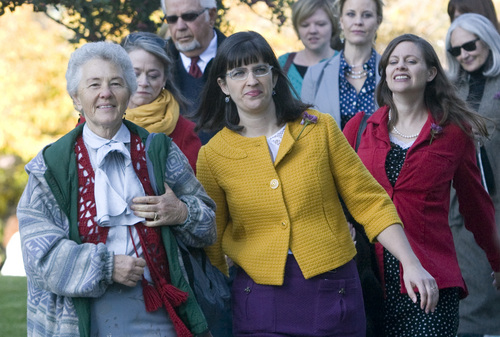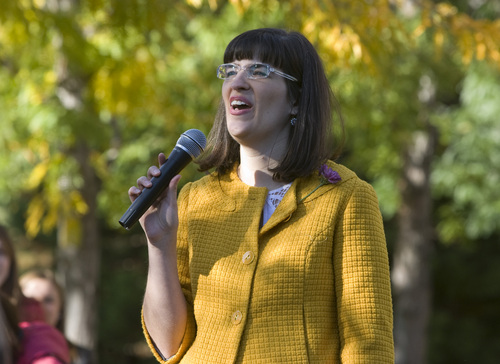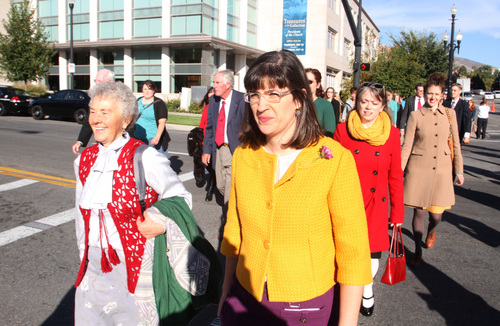This is an archived article that was published on sltrib.com in 2014, and information in the article may be outdated. It is provided only for personal research purposes and may not be reprinted.
A week before Ordain Women founder Kate Kelly was threatened with excommunication for "apostasy," her Provo-based parents were in trouble for supporting their daughter's cause — to open the LDS Church's all-male priesthood to women.
The Kellys, their daughter said, would have to take down their profiles on the Ordain Women website and disassociate with the movement, their Mormon bishop told them. When they refused, the lay leader withdrew their "recommends" (which allow them to enter the faith's temples), a serious deprivation for Kelly's dad, who typically attends the temple once a week.
On May 5, Kelly herself had been put on temporary probation by Scott Wheatley, her LDS stake president (regional leader) in Vienna, Va. He ordered her to give up Ordain Women, a movement she launched, take down its website, and stop talking about female ordination.
She declined. Kelly will continue to work with the group as it seeks a divine answer on female ordination, she said, and none of the 350 Mormons listed on the website has asked to have his or her profile removed — though she worries they may be at risk of church censure.
When asked Thursday if all those members are now in danger of losing their temple privileges, LDS Church spokesman Cody Craynor said, "Qualifying for a temple recommend is a matter between members and local leaders. Those with questions about their personal situation may choose to raise them in that setting."
Kelly's former bishop, Mark Harrison, notified her this week of a June 22 disciplinary council to consider further action, including excommunication, against her. The hearing will be convened in Virginia — despite the fact that Kelly now lives in Utah, where she is staying until she and her husband move to Kenya.
According to LDS Handbook 1, which spells out policies and procedures for lay leaders in the 15 million-member faith, "if a member moves while church disciplinary action or another serious concern is pending, the bishop, or the ward clerk with the bishop's authorization, may contact church headquarters or the assigned administration office and ask for a move restriction on the membership record."
With higher approval, then, Harrison pressed forward with plans for the council 2,000 miles away from where Kelly now lives.
Consequently, Kelly said, she doesn't plan to show up.
It costs too much, she said during Thursday's Trib Talk, and she has a relative with a medical emergency in Utah. But she will gather written testimonials to help present her case. And, because she's a lawyer, she will be writing a brief in her defense. Her bishop and stake president are also attorneys.
Meanwhile, Utahn John Dehlin, who created a popular website and podcast series called "Mormon Stories," received a similar threat of discipline, summoning him to a hearing by June 18. The Cache County researcher and blogger, who describes himself as a churchgoer with serious doubts about LDS history and teachings, has faced possible church sanctions on and off for 10 years.
He was cleared last year to baptize his son, Dehlin said on Trib Talk, so he wondered why he needed to undergo another series of meetings with leaders.
Still, Dehlin plans to attend his disciplinary council, out of curiosity, said. "In my heart and spirit, I do not think God or Jesus — if he lives and exists — would do this. I don't think the heavens will register this as anything but a terrible event."
These anticipated actions have generated heated debates, recriminations, hand-wringing and anxiety across the globe via social media.
Supporters of the two Mormon activists have planned candlelight vigils, including one at the LDS Church Office Building in downtown Salt Lake City on June 22, letter-writing campaigns and even a mass resignation from the faith on Pioneer Day (July 24).
Defenders of The Church of Jesus Christ of Latter-day Saints see the steps as necessary to rein in members who are in open rebellion against the denomination and its doctrines.
"When individuals like John and Kate are not willing to change their public stances against church leadership and doctrines, the church is forced to make a stand," Mormon John D. Wilson wrote in an email from Maricopa, Ariz. "However, it is important to distinguish that this action is not a signal against LDS members who have legitimate questions or doubts, but against those who publicly and consistently defy church leadership."
Others have more mixed feelings.
"I have not supported Dehlin's and Kelly's organizations," Rosalynde Welch, an LDS writer from St. Louis, said in an email. "Their approaches are different, but each is too polarizing, too critical and too activist for my taste,"
Any excommunications "will cause a great deal of harm to struggling members, to the church's public image, and to the quality of discourse both of mainstream LDS members and LDS feminists," Welch warned. "Our worst fears about each other seem to be confirmed — 'See, they really are dangerous apostates!' 'See, the church really is out to squash independent thought!' — and the resulting distrust will hamper important conversations about women in the church."
For observers, this week's news reminds them of 1993, when LDS leaders punished a half-dozen intellectuals who became known as the "September Six." But many thought such a crackdown could never happen again.
D. Michael Quinn, who was tossed out at that time for his research on Mormon history, is one of them.
"This gives the lie to everything I've been telling reporters for the past five years — that the Internet had made this kind of repressiveness untenable, even if compassion and good sense didn't," Quinn said in an interview from Southern California. "Once an organization adopts repressive methods, it's really tough to give them up."
Quinn, an independent researcher, still believes in Mormonism, he said. "It's a divine institution run by the damned human race."
Mormon sociologist Armand Mauss finds differences between the two eras.
"The church in recent years has clearly been changing some of its policies — and a lot of its rhetoric in meetings and manuals, in an effort to accommodate the concerns of outspoken feminists and their quieter allies, as well as homosexual members and those who have been their defenders," Mauss said from Irvine, Calif. "I think the latest disciplinary councils (if they actually result in excommunication) simply represent [an effort] to draw the line more emphatically between dissent (even public dissent), on the one hand, and organized movements seeking to bring pressure for change upon the church leaders, on the other hand."
Ordain Women represents the latter, Mauss added. "Certainly there have been a lot of feminist blogging, writing and conferences for years promoting feminist objectives, some of it pretty strident, but not until OW have disciplinary actions been threatened, as far as I know. ... Official toleration for such dissent in 2014 seems to me much greater than it was two decades ago."
Dehlin hopes his supporters won't leave the faith as an act of symbolic sympathy.
"Don't resign in my name," he told Trib Talk viewers. "Do what makes you happy and healthy."







